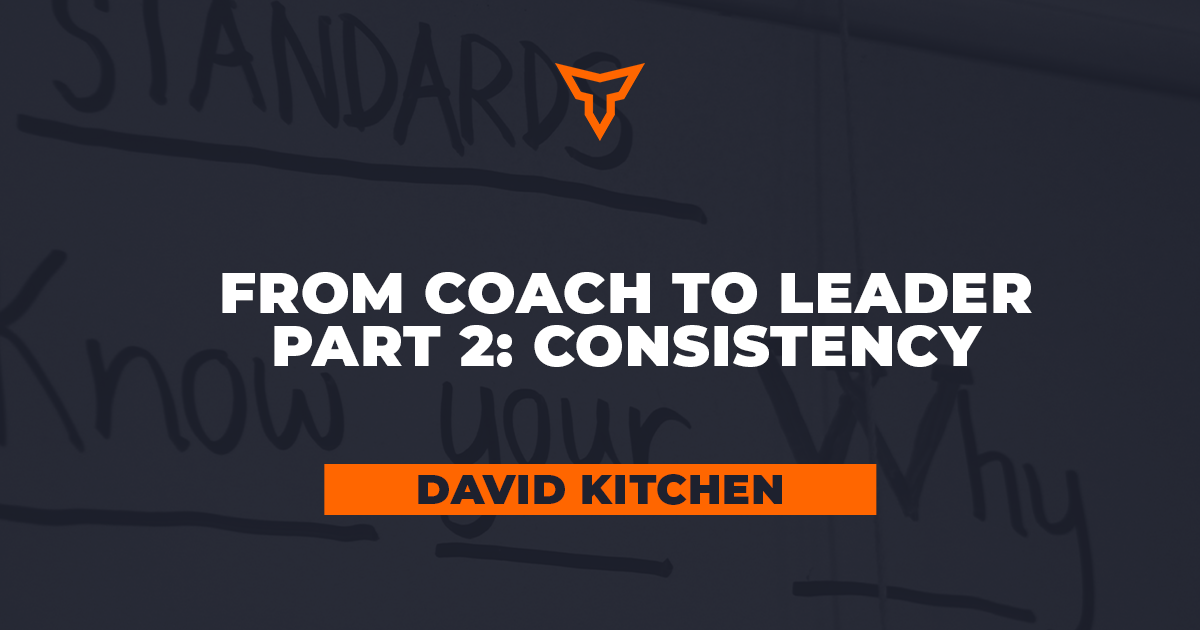Going From Coach to Leader: Using the 5 C's
What is the difference between a coach and a leader? We have all been around coaches who have flat out inspired us to be better and do better. The type of person who leaves you feeling energized and filled with belief as you start mentally preparing for whatever challenge is coming; the type of coach who can bring the best out in anyone they come across. We know it when we see it, and those coaches who are also leaders tend to stand out from the crowd, but what does it actually mean to be a leader in your staff, department, and university? I recently had a conversation with Lew Caralla where he made a statement that really stuck with me. We were discussing earning the right to be called “Coach” and Lew made the point that some coaches go above and beyond the title and become “difference makers”.
If you want to become more than just a coach, and cross into the realm of difference maker and true leadership, you’re in the right place. Over my next five blogs, I will be outlining the “Five C’s” that psychology research has identified as indicators of strong leadership (Character, Consistency, Commitment, Communication, & Creativity). Consider this your acceptance letter to Leadership 101 syllabus week.
In this first blog, we'll explore the importance of character in the context of being a coach. We'll delve into how character influences not only your coaching abilities but also your relationships with athletes, peers, and the community.
Let’s start by defining what a leader is. Oxford defines it as a “the person who leads or commands a group, organization, or country." This definition leaves much to be desired, as the best leaders use the word not as a noun, but as a verb. The leaders we aim to emulate are those who treat the use of the word as a noun as something that is earned through consistent action. Some of you are saying, “Kitch, I worked for 10 years to get this title. I deserve to be here and be respected.” That’s great and I commend your effort, but I would argue you lack a full understanding of what it even was you were chasing for those 10 years. Leadership is about selfless influence not authority or command.
In the realm of strength and conditioning, the words of Robert Greene resonate: "Weak character will neutralize all of the other possible good qualities a person might possess." These words underline a fundamental truth about coaching: Athletes don't buy into programs; they buy into coaches.
Ralph Waldo Emerson illustrated this perfectly in his quote; “Who you are speaks so loudly that I cannot hear what you say.” Simply put, character is the combination of your vision, mission, and values (VMV) that guides your daily behaviors. Your VMV better align with your actions or you will have a hard time leading anyone. Additionally, the VMV of great leaders rarely include much emphasis on their own gain; it’s about something bigger than them. You can review this blog on how to construct your own VMV statement and use it as a roadmap for decision making. For now, here’s the abbreviated version:
Follow the steps below, and define what you’re really about and who you really are. I suggest typing this into the notes section of your phone, saying it out loud, and writing it on reminders in places you see regularly. Internalize this message and use it to guide your behaviors, mindset, and interactions.
Vision: Your vision is what you ultimately want for yourself. This is the big picture, but it should be somewhat tangible. For example, I want to leave a legacy for my family to be proud of. This is the ultimate goal for me as a man and stems from my own personal beliefs. This vision is in the back of my mind at all times and influences all the decisions I make. Every situation is met with the question; will this decision add or subtract from my ability to leave a lasting positive legacy for my family?
Mission: The mission you choose is the how-to manual of executing your vision. How will you accomplish what you envision? In other words, what can you do on a daily basis that will ultimately lead to your vision? For me, I will inspire greatness in those around me.
Values: These are the foundation of your identity. When everything else is stripped away, what do you stand for? Better yet, what do you fight for? For the sake of simplicity, I’d suggest writing a list of no more than 20 words and phrases that mean a lot to you. Once you’ve compiled your list, find the common threads and use 3-5 of those phrases or words as your values. Again, it’s easiest to put it into sentence form. For example, I am driven, honest, caring, and committed to growth.
When you combine your vision, mission, and values you will be left with three powerful sentences that should sum up your character. Put it in the past tense and think about it as the opening paragraph of your eulogy if you wrote it yourself.
Example: I left a legacy for my family to be proud of. I inspired greatness in those around me. I was driven, honest, caring, and committed to growth.
Where Does Character Show Up?
The simple answer is everywhere. Character permeates every facet of your coaching style and personal life. For the sake of simplicity, let’s use these 5 areas to get a baseline.
1. Habits
Your daily actions should mirror your dedication to your athletes' well-being, ethical standards, and your coaching mission. Looking at someone’s habits will tell you exactly what’s important to them. Practice what you preach.
2. Social Interactions
How do you interact with your athletes, your administrators, your coaches, and the custodial staff? Are you an intentional listener? Are you looking to add value and make people’s jobs easier? Most behaviors are caught, not taught.
3. Coaching Circle
Surround yourself with peers who share your values and commitment to excellence. They are a reflection of you, so choose wisely.
4. Self-Regulatory Behaviors
How you react to adversity, setbacks, and successes reveals your character. Trust me, success has buried just as many people as failure. Choosing to respond instead of react is a key component here.
5. Mindset
Embrace a growth mindset in your coaching approach. See challenges as opportunities for growth, and guide your athletes to do the same. The “That’s the way I’ve always done it” mentality doesn’t cut it if you want to be a leader.
You should be auditing these things regularly. We manage data and KPI’s for training, and we should be doing the same for our leadership skills. Build a scorecard and do some reflection every few weeks.
Leading with Character
One of the key components of character is self-awareness. It is impossible to become the leader or person you want to be if you cannot acknowledge your blind spots. This means being open to feedback, discerning what is valuable, and doing the work on yourself. This is not a pretty process, but great leaders will tell you they’re committed to their own growth regardless of the uncomfortable feelings they may have to endure. Below is a quick and dirty self-assessment you can take to figure out if you’re headed in the right direction. (You really thought there wouldn’t be homework during syllabus week?)
Leadership Reflection Questions: Character
- Do I know my personal mission, vision, and values?
- Are my actions aligned with those values?
- Would I want someone I care about to follow someone like me?
- Would I be proud to hear what my followers think of me?
- When’s the last time I did something for someone who could do nothing for me?
- How often do I request feedback from my peers? From friends/family? From subordinates?
- What is my response when I hear feedback that doesn’t agree with my ego? Anger, blame, defend, etc.?
- What is one negative experience that shows up in my actions or behavior patterns?
- How do I plan on correcting this?
- What am I most afraid of?
There are no right or wrong answers, this is just a tool to get the self-awareness process jump started. If you’re unhappy with your current results, form a plan and execute! Character is not an end goal; it is an evolving and ongoing process that will be reflected in your relationships.
Leaders operate under the understanding that the spotlight is always on. A mentor of mine used to say we must act as though the camera is always recording. Does this scare you? It shouldn’t…. if you’ve done the work on yourself to build a character that is rooted in principles and values. Your core values will be reflected in your actions both consciously and subconsciously. Those values should put a healthy pressure on you to earn your leadership position daily. Every day should be viewed as an opportunity to prove through consistent acts of high character that your followers are right for putting their trust in you. Remember, most of your followers are looking to be proved right. This means opportunities will be available to do so; if you are willing to keep their interests ahead of your own. To be a leader you must first be a person worth following.
I take this principle very seriously, as I believe leadership is a responsibility. You are responsible for the people you are leading. In some capacity, all those people have bet on you. Again, this doesn’t end when the work day is over. Your role may be to lead the family through a difficult time or lead your team through a coaching transition or culture rebuild. In all those situations, your followers placed their money on you to win. This means you owe it to them to operate with their best interests in mind. But, but, but “I worked my butt off for this role”. Good. Now, work your butt off for them, because the minute you become a leader nothing is about you anymore. Leaders’ first reaction must be to jump on the grenade when the timer hits zero and all options are exhausted. More importantly, they should take great pride in their team succeeding with little or no recognition going to them. As Jocko Willink put it so elegantly, “there are no bad teams, only bad leaders”. Leaders are built, not born.
Subscribe to our blog
Subscribe to receive the latest blog posts to your inbox every week.
Related posts

A Strength Coaches Guide to Getting the Edge in Leadership

From Coach to Leader Part 2: Consistency

